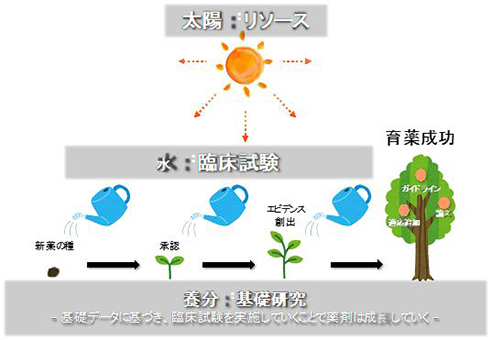[共同研究部門] 抗がん剤育薬共同研究部門 Molecular Cancer Biology
-
教授 Professor
北尾 洋之 Hiroyuki Kitao, Ph.D.
-
准教授 Associate professor
飯森 真人 Makoto Iimori, Ph.D.
 抗がん剤の開発には、長い年月と多額の資金を要する研究開発と治験が必要です。そのようなプロセスを経て、治療効果と安全性が科学的・臨床的に確認され、正式に承認されたものががん患者に投与されます。このような新しい抗がん剤をより良い薬に育てていくためには、臨床試験などを通じて、実際にがん患者に投与した時に得られる情報に基づく「育薬」が必要です。また、「育薬」をきっかけに、新しい治療薬の開発につながることもあります。当部門では、製薬企業と連携し、抗がん剤の「育薬」とその先にある創薬を実現するための基礎研究に取り組んでいます。また、基礎と臨床を橋渡しするトランスレーショナル・リサーチにも力を入れています。
連携企業:大鵬薬品工業株式会社
抗がん剤の開発には、長い年月と多額の資金を要する研究開発と治験が必要です。そのようなプロセスを経て、治療効果と安全性が科学的・臨床的に確認され、正式に承認されたものががん患者に投与されます。このような新しい抗がん剤をより良い薬に育てていくためには、臨床試験などを通じて、実際にがん患者に投与した時に得られる情報に基づく「育薬」が必要です。また、「育薬」をきっかけに、新しい治療薬の開発につながることもあります。当部門では、製薬企業と連携し、抗がん剤の「育薬」とその先にある創薬を実現するための基礎研究に取り組んでいます。また、基礎と臨床を橋渡しするトランスレーショナル・リサーチにも力を入れています。
連携企業:大鵬薬品工業株式会社
Research
“Ikuyaku” is a process of observing and reviewing the effects of a drug in the patients even after it has been released onto the market. For the chemotherapeutic drug, ikuyaku is an important step to maximize the efficacy of the drug with minimal adverse events. The process of ikuyaku also provides a chance of innovative development of novel drug. Our group collaborates with a pharmaceutical company and focuses on the basic medical research to achieve the “ikuyaku” of chemotherapeutic drugs and the upcoming drug development. We are also putting strength into translational research that links the basic medical science with clinical practice. Collaborating company: Taiho Pharmaceutical Co., Ltd.
代表論文
-
- Kataoka Y et al. DNA replication stress induced by trifluridine determines tumor cell fate according to p53 status. Mol Cancer Res. in press 2020
- Fujimoto Y et al. Detection of trifluridine in tumors of patients with metastatic colorectal cancer treated with trifluridine/tipiracil. Cancer Chemother Pharmacol. 85:1029-1038. 2020
- Kataoka Y et al. Cytotoxicity of trifluridine correlates with the thymidine kinase 1 expression level. Sci Rep. 9:7964. 2019
- Edahiro K et al. Thymidine Kinase 1 Loss Confers Trifluridine Resistance without Affecting 5-Fluorouracil Metabolism and Cytotoxicity. Mol Cancer Res.16:1483-1490. 2018
- Kitao H et al. DNA replication stress and cancer chemotherapy. Cancer Sci. 109:264-271. 2018
- Nakanishi R et al. Monitoring trifluridine incorporation in the peripheral blood mononuclear cells of colorectal cancer patients under trifluridine/tipiracil medication. Sci Rep. 7:16969. 2017
- Kitao et al. The antibodies against 5-bromo-2'-deoxyuridine specifically recognize trifluridine incorporated into DNA. Sci Rep. 6:25286. 2016
- Iimori et al. Phosphorylation of EB2 by Aurora B and CDK1 ensures mitotic progression and genome stability. Nat Commun. 7:11117. 2016
- Matsuoka et al. Trifluridine Induces p53-Dependent Sustained G2 Phase Arrest with Its Massive Misincorporation into DNA and Few DNA Strand Breaks. Mol Cancer Ther.14:1004-1013. 2015
- Kiyonari et al. The 1,2-Diaminocyclohexane Carrier Ligand in Oxaliplatin Induces p53-Dependent Transcriptional Repression of Factors Involved in Thymidylate Biosynthesis. Mol Cancer Ther.14:2332-2342. 2015
- Nakanishi et al. FANCJ expression predicts the response to 5-fluorouracil-based chemotherapy in MLH1-proficient colorectal cancer. Ann Surg Oncol.19:3627-3635. 2012
- Fujinaka et al. ATR-Chk1 signaling pathway and homologous recombinational repair protect cells from 5-fluorouracil cytotoxicity. DNA Repair(Amst).11:247-258. 2012